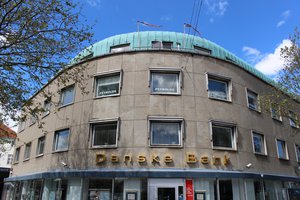This week ministers from the Overseas Territories will be sitting down with the Foreign Office to figure out how they are going to follow through on the UK Parliament’s historic vote to require them to create public registers of the real owners of their anonymous companies. So they won’t be anonymous anymore.
It will no doubt be a tempestuous meeting – at least two of the islands have threatened to re-negotiate their relationship with the UK in response to the new requirement. And to be fair, transitioning to public registers will be a challenge for these places – they’ve built their entire economies around selling secrecy. But luckily, the UK is in a position to help. The UK’s register of companies has been public since 2016 and the government is perfectly placed to coordinate the technical and financial assistance needed to get effective open registers up and running.
But what of the UK’s tax havens closer to home?

The Island of Jersey, which is yet to open up public registers of anonymous companies / Credit: Falco
The likes of Jersey, Guernsey, and the Isle of Man are often rather peeved to be lumped together with the likes of BVI or Cayman. In fact, they claim to have very rigorous and effective anti-money laundering regimes. But a quick look at just a few the crooked companies these jurisdictions have incorporated, suggests they’re more like their sunnier counterparts than they would have us believe.
First up, Jersey.
The thing that sets Jersey apart from other international financial centres is our strong regulatory framework – one of the strongest in the world – designed to bring clarity and transparency to the world of finance. - Jersey International Finance Centre
This framework is known as the ‘Jersey model’. Under this system, companies are incorporated in Jersey following a two-step process to determine and verify ultimate ownership. Once verified, this information sits in a private registry accessible only to law enforcement and Jersey regulators.
Jersey argue that this approach, married with adherence to international anti-money laundering standards pertaining to trusts and companies, provides sufficient safeguard against abuse. Which is all well and good if you have confidence in the rigour of what goes on behind closed doors.
But we know better than that.
We need only look at how a Jersey trust was utilised by the Prince of Brunei to question their promotional material. And when it comes to companies, their robust approach isn’t always evident either.
In 2014, following a lengthy investigation and court case, the US Department of Justice was finally able to seize a 36-floor skyscraper on New York’s Fifth Avenue which was ‘secretly owned and controlled’ by the Iranian government which was found to have used anonymous companies incorporated in New York and Jersey to breach sanctions. Model behaviour? Not so much.
How does the Isle of Man fare? According to MONEYEVAL, despite recent attempts to strengthen the Dependency’s defences against money laundering, deficiencies related to the Isle of Man’s ability to maintain beneficial ownership information remain.
This in spite of the fact that in 2017 this sleepy Dependency became front-page news for all the wrong reasons. An investigation by the OCCRP and the Guardian newspaper found that well-connected individuals in Moscow moved billions out of Russia and into the western financial system - a hefty amount of which flowed through Manx shell companies.
And now to Guernsey. Here too, we have evidence of anonymous companies up to no good. According to an investigator commissioned by the International Criminal Tribunal for the Former Yugoslavia, a Guernsey company called Southmed had the dubious accolade of participating in an ‘intricate’ offshore finance structure allegedly created by Slobodan Milosevic in order to provide funding, equipment and supplies for the army of the Yugoslavia and the Serbian Ministry of the Interior.
More recently, assessments undertaken by the IMF and MONEYEVAL have repeatedly called out Guernsey’s poor enforcement of money laundering and which they have deemed “inadequate” given the size and nature of the dependency’s financial sector.
It is clear that just like the Overseas Territories, the Crown Dependencies still have a dirty money problem.
And though they might refuse to believe it, making their company registers public would help them clean up their act.
A case in point is the UK’s public register, which, though still in its infancy (and admittedly with room for improvement) is already demonstrating that open data registers of beneficial ownership are a public good.
Our analysis of the UK register reveals that criminals are moving away from secrecy vehicles as they are brought within the scope of transparency rules.

Danske Bank has been subject to investigations over suspect money flowing through its Estonian branches / Credit: Finn Årup Nielsen
Look at the case of Scottish Limited Partnerships. These secrecy vehicles have been implicated in some of the biggest money laundering schemes in recent years, from the Azeri and Moldovan Laundromats to the Danske Bank scandal.
But since the UK government announced that SLPs are going to be forced to publicly disclose their beneficial owners and lose their secrecy status, incorporation rates have plummeted.
The register has also proved a hit with the public. Since paywalls were removed in June 2015, access to UK company registry data has grown exponentially to over 2 billion data searches a year - compare with just over 6 million access requests a year for paid information during 2014-2015.
There is both an appetite and need for this information to be in the public domain.
As the UK launches a global campaign for beneficial ownership transparency, it’s clear to us the government must first clean up its own backyard and hold the Isle of Man, Jersey, and Guernsey to the same standards as Overseas Territories.



